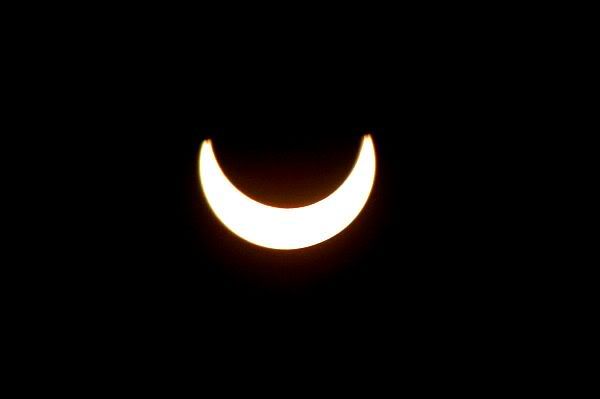photax
Lifetime Member
  
Posts: 1,915
|
Post by photax on Jan 4, 2011 11:51:00 GMT -5
Hi ! I viewed a partial solar eclipse, which could be seen over Europe today during the late morning. I considered to take the camera to work, but i thought it would be a cloudy morning and I could not find my "special" foil in the haste, from which I made a sun-filter for the total solar eclipse in 1999. So this picture is from a collegue who took it through a x-ray photograph.  MIK |
|
daveh
Lifetime Member
  
Posts: 4,696
|
Post by daveh on Jan 4, 2011 12:52:29 GMT -5
I didn't even know there was one today. Cloudy most of the day here, but clearing at the end for a fairly dramatic sunset. (MIK, as an aside: the English language is really strange in having rules and then umpteen exceptions to each rule. While is is correct the a word starting with 'x' should have the pronoun a - as in a xylophone - it is not always so. X-ray is a case in point: it is an x-ray. I think it has come about because an x-ray flows off the tongue easier than does a x-ray, as the initial sound is that of an e.) Getting back to the photo - I'll have to take your word for it, that it is really a solar eclipse.  |
|
PeterW
Lifetime Member
   Member has Passed
Member has Passed
Posts: 3,804
|
Post by PeterW on Jan 4, 2011 16:43:07 GMT -5
Dave,
As a rule, though there are probably numerous exceptions, it is usual to use a before words starting with a consonant, and an before words starting with a vowel.
One exception which used to be common in spoken English was with some words starting with an h where the h was often not aspirated, such as hotel or historic.
You still hear this from some newsreaders and commentators on radio and TV, and from many academics, but it is generally considered archaic by ordinary mortals who sound the h.
PeterW
|
|
|
|
Post by Randy on Jan 4, 2011 16:53:00 GMT -5
That is an excellent photo. ;D
|
|
daveh
Lifetime Member
  
Posts: 4,696
|
Post by daveh on Jan 4, 2011 17:02:11 GMT -5
Peter,
That is what I was trying to get at - though I note that my English isn't all it should be in the post above.
Aitches are as strange as the rest of English, as you say. I would tend to say "a house" but "an hotel". Again, I think it is because of the sound of the initial letter in the word. Interestingly those who say the letter H as hhhaitch, often tend to drop the letter itself when they use it in a word; as in 'alfpenny (well they would if we still had them).
In terms of before a vowel there are exceptions too: such as
a union. Again, it depends on the sound of the word.
Dave.
|
|
mickeyobe
Lifetime Member
   Resident President
Resident President
Posts: 7,280
|
Post by mickeyobe on Jan 4, 2011 18:33:44 GMT -5
Hey Herb!
What kind of herbs are you growing, eh?
Mickey
|
|
SidW
Lifetime Member
  
Posts: 1,107
|
Post by SidW on Jan 5, 2011 19:29:45 GMT -5
Dave, the X in X-ray is the letter x, eks, just like D-link, A-train, F-word, T-test.
The name of the letter x is pronounced eks, starting with a vowel, needs "an" rather than "a".
F-word, is pronounced with the name of the letter f, "eff-word"
which starts with a pronounced vowel that triggers "an". Or it
would do, except there's only one F-word (despite it's various
shapes and sizes). But something similar happens to the
pronunciation of "the" in many dialects: "thee eff-word" but "tha
tea-test" (T-test).
It's the pronunciation that triggers "an", not the writing, so
union, pronounced with a consonant at the beginning, (like
"you-nion") doesn't trigger "an".
|
|